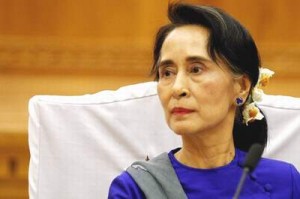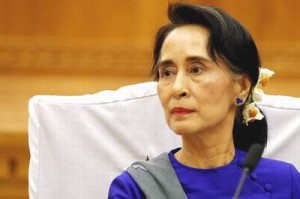Wall Street Journal
SHIBANI MAHTANI
 A newly elected legislature will nominate this country’s new president Thursday in a selection process that is testing the delicate relationship between the still-powerful military and the democracy movement led by Aung San Suu Kyi, whose party dominates parliament.
A newly elected legislature will nominate this country’s new president Thursday in a selection process that is testing the delicate relationship between the still-powerful military and the democracy movement led by Aung San Suu Kyi, whose party dominates parliament.
Ms. Suu Kyi is constitutionally barred from being a candidate. But her National League for Democracy is expected to use its overwhelming legislative majority to install a candidate from its ranks who is likely to have little of Ms. Suu Kyi’s stature and whom she has already stated she will control from behind the scenes.
The new president will be the first to lead a democratically elected government whose leaders are untainted by military links since the armed forces seized power in 1962. The new government follows a nominally civilian transition regime of former generals who ruled from 2011 but were defeated in the November election in which the NLD swept both houses of parliament.
The NLD hasn’t said who it will offer up as a candidate, and party leaders have offered only vague clues. Win Htein, a central executive committee member, has said that Ms. Suu Kyi “cannot be president” and has suggested only that the candidate’s name will have two words.
A name that has been floated is Htin Kyaw, an Oxford graduate, senior party member and son-in-law of NLD co-founder U Lwin. Another potential candidate is Tin Oo, a former co-leader of the party and onetime general, who is almost 90 and frail.
Speculation has also turned to Ms. Suu Kyi’s personal physician, Tin Myo Win, or her personal secretary and closest confidant, Tin Mar Aung.
Mr. Tin Oo has previously insisted that Ms. Suu Kyi must be president. None of the others has commented.
“In general, it is not that important who the president is, as long as it is the right kind of person—someone who follows instructions from Aung San Suu Kyi,” said Richard Horsey, a Yangon-based analyst. “But if it is someone who ruffles the feathers of the military or develops ideas different from hers, then it matters a lot.”
Ms. Suu Kyi rose to prominence in the democracy movement in 1988, when Myanmar’s military crushed street protests in a bloody crackdown. She was awarded the Nobel Peace Prize in 1991.
The head of state will be chosen under a constitution imposed when the military was in power. It states that no one with close foreign relatives can be president; Ms. Suu Kyi’s two sons are British, as was her late husband. The constitution reserves one-quarter of seats in parliament for serving military officers—enough to block any amendments, which need more than 75% support.
NLD officials had briefly sought support to suspend the constitutional prohibition, rather than amend it, but the armed forces refused to consider such an option.
Under the selection procedures, the upper and lower houses of parliament and the military bloc can each nominate a vice president. The three groups then vote on which candidate will be elevated to president. The NLD’s choice is assured passage, given that the party controls both houses. Both the losing candidates will be vice presidents.
The NLD’s second nominee is likely to be an ethnic-minority candidate from an affiliated ethnic-based party, according to party officials. It is unclear who the military bloc’s candidate will be.
The candidates’ names will be put forward on Thursday, but it is unclear how long the selection process will take to finalize. The new president will then pick a cabinet, and officially take over the government on April 1. None of the names in circulation has the repute of Ms. Suu Kyi, the daughter of independence hero Aung San. She spent some 15 years under house arrest and became the global symbol of her country’s struggle for democracy. The party is built around her and has been criticized, even from within, for not developing more leaders who will be needed, for example, to fill cabinet seats.
Since the election, Myanmar’s 51 million people have been left to speculate who will be president. Small gestures, such as a handshake between Ms. Suu Kyi and a party leader, have sparked rumors that have circulated in tea shops and homes countrywide. A recent news release from an unknown source announcing the NLD’s vice-presidential selection was shared within minutes by hundreds of people on social media before the party dismissed it as false.
“I am interested in who will be the president, but not as much the fate of [Ms. Suu Kyi] and what kind of role she will have in government,” said Ye Lin Htut, who works at a trading firm. “All we want still is for [Ms. Suu Kyi] to become president, or our democracy is not complete until she leads directly.” No matter who is picked, Ms. Suu Kyi has stated that she intends to lead from “above the president” and issue instructions in all important matters. Foreign investors and diplomats have wondered how they will manage a relationship between a proxy president and Ms. Suu Kyi. The biggest unknown is how the arrangement will be managed with the military, which retains control over key ministries. Its forbearance is needed for Ms. Suu Kyi to meet popular expectations to implement democracy and improve an economy that remains among the world’s least-developed. Military generals have indicated that constitutional change can only happen after a few years and that they must continue to have a political role during that time.



